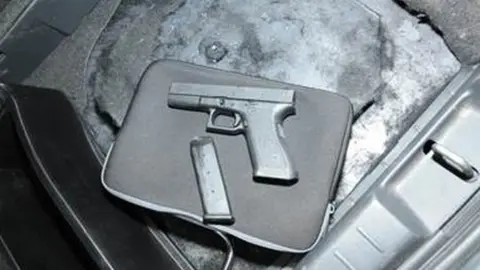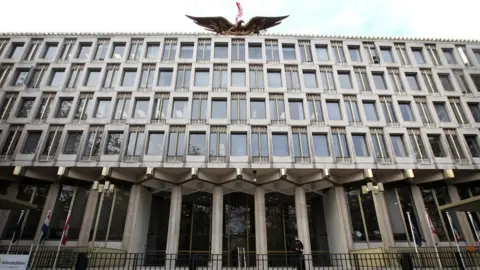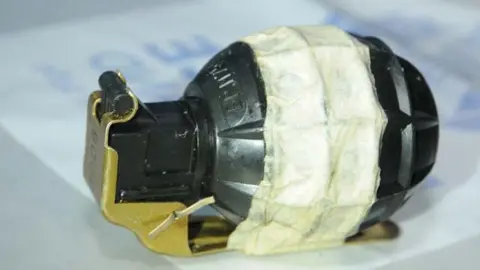The downfall of Scotland's most dangerous crime gang
 Crown Office
Crown OfficeThe downfall of Scotland's most sophisticated crime gang was triggered by a surveillance operation on a Toyota Yaris.
The nine men, who have been sentenced to a total of 87 years between them, went to remarkable lengths to conceal a terrifying arsenal of weapons, vast quantities of drugs and large amounts of dirty money.
To hide their guns, the gang built hidden compartments in a fleet of vehicles which they kept in heavily fortified lock-ups.
At the same time they used state-of-the-art surveillance equipment in a bid to establish if their network, which imported a million wraps of cocaine a year, had been compromised by the authorities.
Det Ch Supt Gerry McLean, head of the Organised Crime and Counter Terrorism Unit (OCCTU), said: "The gang posed one of the greatest challenges to covert policing in Scotland and the UK."
BBC Scotland can reveal Police Scotland is already working with the US Drug Enforcement Agency (DEA) and the FBI on the next phase of Operation Escalade.
It will target the Godfathers behind a criminal enterprise that generated more than £100m a year and stretched from Baillieston to Brazil.
 Police Scotland
Police ScotlandAt the start of 2017 the OCCTU were monitoring several properties and vehicles linked to the gang.
But the breakthrough in a year-long undercover operation came about 18:00 on 20 January last year.
Two officers were watching a silver Yaris in Church Street, Baillieston, on the eastern outskirts of Glasgow, when they spotted Mark Richardson.
Intelligence had linked the Edinburgh-based gangster with the group but this was a chance encounter that changed everything.
Det Ch Supt McLean said: "It was the tipping point.
"The Yaris had been part of the surveillance operation but Richardson's arrest was the moment it switched from a covert to an overt operation."
The officers gave chase and he was eventually rugby-tackled to the ground.
Hidden compartment
Det Ch Supt McLean said: "Richardson had the Yaris keys on him.
"We noticed a fob which did not appear to activate any alarm on the Toyota."
The detectives discovered there was a Bluetooth device in the rear cluster light of the car and the fob activated it.
"When you activated the Bluetooth receiver there was a metal plate in the boot of the Yaris which came up on a hydraulic ram," Det Ch Supt McLean said.
"Within that they found a neoprene holster containing a 9mm Glock 17 handgun."
The pistol, which contained Richardson's DNA, was loaded with 15 bullets.
The detective said: "On a random stop there would have been next to no chance of finding it."
 Crown Office
Crown OfficeThe arrest set in motion a chain of events which unravelled a vast criminal network.
The following week officers discovered several sets of car keys, including one labelled "Annie", in an industrial unit on Croftside Avenue in the Croftfoot area of south Glasgow.
 Crown Office
Crown OfficeAnother unit on Westburn Farm Road, Cambuslang, was a key logistical hub and is believed to have been the main workshop where Francis Mulligan and Anthony Woods modified some of the gang's £250,000 fleet of vehicles.
By cross-referencing the keys to addresses linked to the gang, police arrived at a lock-up on Whittingehame Drive, Anniesland, in the west end of Glasgow, on 5 February.
There the gang rented space under a false name and paid the monthly £500 fee upfront and in cash.
'Golden nugget'
Det Ch Supt McLean said: "We knew they had been in Whittingehame Drive previously and we walked down a row of lock-ups.
"There was a big shiny door with two padlocks and the rest were all wooden doors falling apart.
"We had a key fob on a key that said 'Annie' and we were in Anniesland.
"It was a real golden nugget."
Inside officers found 11 guns, all neatly packaged and labelled.
They included Glock pistols, a Heckler and Koch sub-machine gun and a M75 hand grenade.
 Crown Office
Crown OfficeThe deadly haul also delivered a treasure trove of forensic evidence.
Crucially, it led to the discovery of torture victim Robert Allan's DNA on a Beretta which had been used to pistol-whip him in March 2015.
Prosecutor Alex Prentice QC told the High Court in Glasgow: "The firepower at the disposal of this group is unprecedented in terms of the history of organised crime in Scotland."
Former soldier Martyn Fitzsimmons was the gang's main ballistics expert and was jailed in 2008 for supplying stolen army weapons to crime groups, including the Daniel family.
 Crown Office
Crown OfficeLorry driver David Sell, who abducted Allan after he was unable to pay a £30,000 drug debt, was also a key figure.
And BBC Scotland can reveal 50-year-old Sell made trips to Brazil for the gang.
There he met face-to-face with cartels to source high-purity cocaine.
He then arranged shipment of the Class A drug from South America to Europe, via West Africa, and had an influence over how it would be packaged and concealed.
 Crown Office
Crown OfficeBack in Scotland the gang invested heavily in cutting edge US anti-surveillance equipment, which enabled them to do technical sweeps of their cars and premises.
Ironically they sourced kit, such as listening devices and a machine that detected illegal transmissions, from the same companies that supplied law enforcement and the military.
As a result detectives had to carry out a number of risk management meetings to assess the technical capability of the group and determine whether covert officers were at risk of being detected.
'Jamming the airwaves'
Det Ch Supt McLean said: "We had intelligence that they had a high degree of capability and when we were deploying techniques against them we were not seeing the results we expected to see.
"For example when we were following them we suspected they were using jamming equipment because there wasn't any signals coming from the vehicles when they used phones or any other digital devices.
"We suspected they were jamming the airwaves and that was making it difficult for us.
"We adjusted and refined out techniques so that we did not show a large digital footprint when we had them under surveillance."
Key lessons from the investigation have already been shared with law enforcement partners.
Before the case even came to court Det Ch Supt McLean was briefing UK counterparts about the unprecedented challenges his officers encountered.
One such presentation at Scotland Yard on 22 March was cut short as a result of the Westminster Bridge terror attack.
Det Ch Supt McLean said the case highlights the force's need to invest in technology and become "digitally enabled".
The masterminds behind the Escalade gang and their key lieutenants are believed to divide their time between Spain and Portugal.
But the success of their operation relies on sourcing cocaine direct from crime syndicates on the other side of the world.
 AFP/Getty
AFP/GettyAs a result Police Scotland have held regular meetings with the FBI and DEA at the US embassy in London to discuss the group.
The OCCTU boss said: "We know that some of those convicted had travelled to South America, including Brazil.
"That has caused us to look to the US DEA to provide support, such as surveillance, on the streets of South America."
 Crown Office
Crown OfficeThe force is also coordinating intelligence about the gang with the UK National Crime Agency, Europol and Interpol.
Det Ch Supt McLean added: "The traditional view is that a criminal makes their money here and then enjoys their time in the sun.
"What they are now doing is taking a lot of their criminal base overseas to try to evade law enforcement.
"But they should be aware that, working with our international partners, we now have a global reach."
